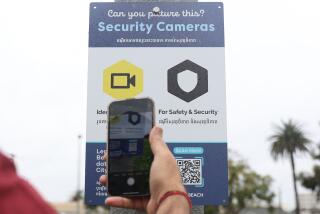Secret Eyes Spying on Manhattan
- Share via
NEW YORK — As if there weren’t enough reasons to look over your shoulder in New York City these days, take a walk through Midtown with surveillance camera tour guide Bill Brown. He’ll give you dozens more excuses to be anxious.
“I’m just an average person who is trying to figure out what is going on in the city I was born in and love,” explained Brown, a Brooklyn native. “I don’t think I’m paranoid -- I think the people who are paranoid fill the streets with cameras.”
Part performance artist, part privacy advocate, Brown, 43, a free-lance copy editor, has been giving free walking tours of Manhattan’s most camera-dense neighborhoods on Sundays for the last two years.
Focusing on such areas as Times Square, Chelsea, the United Nations, Washington Square Park and Fifth Avenue, Brown tells his tour groups there are roughly 5,000 cameras watching the streets of Manhattan. And those are just the ones he can see.
Standing on 16th Street between Eighth and Ninth avenues, he points out 16 cameras Most are easy to spot.
“This block is a kind of an open-air museum of different cameras,” he said.
Brown says 90% of Manhattan’s surveillance cameras belong to private companies concerned about protecting property and lower insurance rates.
Others, he claims, are police cameras -- such as one at Eighth Avenue and 14th Street, which at first glance looks like a streetlight.
Police don’t dispute his claim, but won’t discuss their methods. “Any security-related issues we don’t comment on,” said Officer John Sullivan, a spokesman.
On a recent Sunday, Brown did a little dance in front of one camera, holding up a copy of the Constitution -- which he claims outlaws such surveillance. He then smacked an eye-level sticker on the pole that read: “You Are Being Watched, Surveillance Camera Notice.”
He went through a similar routine in front of the city’s traffic light-scofflaw cameras at Ninth Avenue and 20th Street, and yet again outside an office of American District Telegraph, a 130-year-old international electronic security provider.
Robert Volinski, Manhattan sales manager for ADT, is unabashed about surveillance cameras.
He says the closed-circuit TV monitoring industry is growing by 15% a year. Companies install cameras primarily to let employees know someone is watching and to record activity in and around their premises, Volinski said.
“I can show you equipment through which you can look in at what’s going on at your company’s Puerto Rican or California headquarters -- not to mention your own front door,” he said.
Brown’s tours, which are free, attract only a handful of people. Even on his best days, Brown says, he draws only about a dozen. He doesn’t advertise, but he does place items in local newspaper calendars and publicize the tours on his Web site.
Pat Volpe of Brooklyn, who signed up for Brown’s tour after seeing his Web site, was dismayed by the surveillance.
“It’s disturbing. It’s symptomatic of our civil liberties and privacy being encroached upon,” Volpe said.
The same tour group included a German television crew, portraying Brown as a lonely voice of outrage against the Patriot Act, a post-Sept. 11 law that broadened government surveillance powers.
Brown said his tours are partly based on a list of surveillance cameras compiled by the New York Civil Liberties Union.
“When you can’t walk down the block without someone capturing you on camera you lose your anonymity, your privacy, whether it’s from the government or private entities,” said Donna Lieberman, executive director of the NYCLU.
Everyone, Brown said, has something they’d rather keep to themselves, whether it’s a tryst, a political opinion, a cry or a drunken fall.
One large camera, pointing down on 16th Street, particularly disturbed Brown during a recent tour.
“This one is predatory, raptor-like,” he said. “It epitomizes what is even the aggressive language of cameras -- you ‘shoot’ something, you ‘capture’ something.”
*
Brown’s Web site: www.notbored.org
More to Read
Sign up for Essential California
The most important California stories and recommendations in your inbox every morning.
You may occasionally receive promotional content from the Los Angeles Times.













